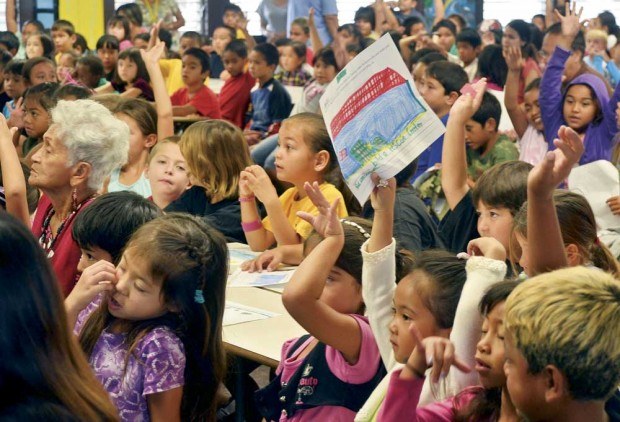KEKAHA — Long-time Kekaha resident Jose Bulatao was ecstatic beyond words Friday morning, calling the special assembly “precedent-setting.” The entire Kekaha Elementary School student population, along with a handful of concerned Kekaha residents and parents, gathered to find out the
KEKAHA — Long-time Kekaha resident Jose Bulatao was ecstatic beyond words Friday morning, calling the special assembly “precedent-setting.”
The entire Kekaha Elementary School student population, along with a handful of concerned Kekaha residents and parents, gathered to find out the results of a week-long exercise in civic responsibility.
“My kids came to this school, and my grandkids came to this school,” said Evelyn Olores, one of the visiting residents. “I’m concerned about what would happen to this town’s kids 20 years from now.”
Jason Yoshida, the school’s principal, said the purpose of the week-long activity was to prepare the students to become respectable citizens, to have a civic responsibility and to participate in the community.
Kekaha School staff accomplished this by taking a local community issue and, after gathering information and discussions, voting on options.
“It’s the process and not the issue which is important,” Yoshida said. “When these students grow up, they will need to take the initiative, and some will remember learning this in elementary school and become active, participating students.”
The issue put forth was to take care of the environment and examine what can be done to make things better for everyone.
With the help of Yoshida, student representatives from each grade, kindergarten through fifth, had an opportunity to voice their findings and opinions on the subject matter at the assembly, where visiting guests were glued to their seats as students voiced their opinion. The school’s student body president expressed gratefulness for the experience in “civic engagement, where we had the chance to discuss a real-life situation which affects our town.”
Students in the older grades turned to the Internet to gather information, while other students used critical thinking to make their decisions.
The consensus agreed that government leaders need to make respectful decisions that will ensure the safety of not only the people today, but the people of tomorrow as well.
In the shadow of the hulk, which was once the thriving Kekaha Sugar Mill, students agreed contaminated soil should be removed and taken away, variants including covering the contaminated areas with concrete and stone and, in an extreme case, vacuuming up the contaminated dirt.
This was verified by 192 votes of 280 cast, or 69 percent, of the responders agreeing the contaminated soil should be removed, Yoshida said, announcing the results of the balloting.
“We should build an electric company so the homeless can get jobs and money,” a second-grade student said, Yoshida pointing out the critical thinking involved in the decision. “For the community, we would like to have a water park with a hotel.”
A water park or swimming pool was a common answer among the students, despite the community being located just across the road from what Yoshida described as “the world’s largest swimming pool — the ocean.”
A third-grade representative said Kekaha should have a Costco so people don’t need to drive all the way to Lihu‘e for everything, and other variants included the construction of a Walmart and a Fun Factory.
“They’re worried about jobs,” Bulatao said. “Having a big store creates employment opportunities from entry level through management. This is really thinking ahead.”
Once the contaminated soil is removed, other suggestions included building a church and a community garden. Another student said a house should be built for everyone to use so there would be no homelessness.
Yoshida said the school plans on doing more of these types of activities because it makes a difference, the younger students relying on drawing their messages.
Jeannie Warren, a school counselor, said invitations were sent out to government officials to attend the assembly. State Representative Dee Morikawa responded to say she could not attend due to a Honolulu meeting but wanted to see the results of the students’ work.
• Dennis Fujimoto, photographer and staff writer, can be reached at 245-3681 (ext. 253) or dfujimoto@ thegardenisland.com.



